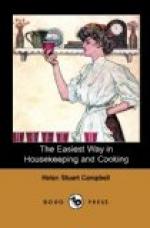In France the pot-au-feu, or soup-pot, simmers in every peasant or middle-class home, and is not to be despised even in richer ones. In this dish, a small portion of meat is cooked so judiciously as to flavor a large mass of vegetables and broth; and this, served with salad and oil and bread, forms a meal which can hardly be surpassed in its power of making the most of every constituent offered. In Germany soups are a national dish also; but their extreme fondness for pork, especially raw ham and sausage, is the source of many diseases. Sweden, Norway, Russia,—all the far northern countries,—tend more and more to the oily diet of the Esquimaux, fish being a large part of it. There is no room for other illustrations; but, as you learn the properties of food, you will be able to read national dietaries, from the Jewish down, with a new understanding of what power food had and has in forming national peculiarities.
It is settled, then, that to renew our muscles which are constantly wearing out, we must eat the food containing the same constituents; and these we find in meat, milk, eggs, and the entire gluten of grains, &c, as in wheaten-grits or oatmeal.
Fat and heat must come to us from the starches and sugars, in sufficient supply to “put a layer of wadding between muscles and skin, fill out the wrinkles, and keep one warm.” To find out the proportion needed for one’s own individual constitution, is the first work for all of us. The laborer requires one thing, the growing child another, the man or woman whose labor is purely intellectual another; and to understand how best to meet these needs, demands a knowledge to which most of us have been indifferent. If there is excess or lack of any necessary element, that excess or lack means disease, and for such disease we are wholly responsible. Food is not the only and the universal elixir of life; for weak or poor blood is often an inheritance, and comes to one tainted by family diseases, or by defects in air or climate in general. But, even when outward conditions are most disastrous, perfect food has power to avert or alter their effects; and the child who begins life burdened with scrofulous or other diseases, and grows to a pale, weak, unwholesome youth, and either a swift passing into the next world, or a life here of hopeless invalidism, can, nine times out of ten, have this course of things stopped by scientific understanding of what foods are necessary for such conditions.
I propose to take the life of one who from babyhood up has been fed on the best food, perfectly prepared, and to give the tables of such food for different periods in that life, allowing only such digression as will show the effects of an opposite course of treatment; thus showing the relations of food to health,—a more necessary and vital form of knowledge than any other that the world owns.




